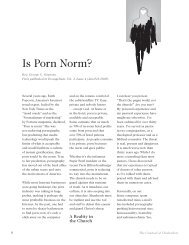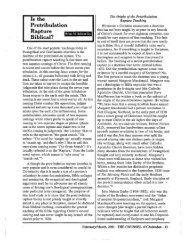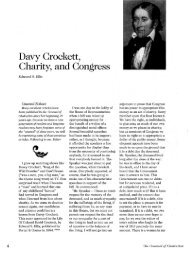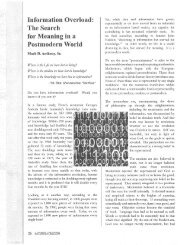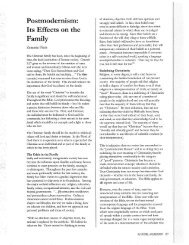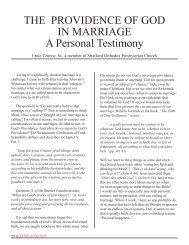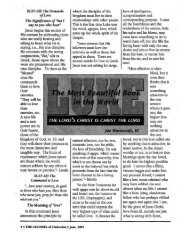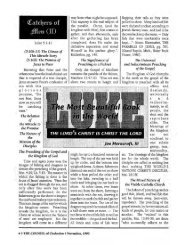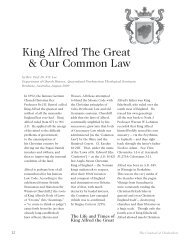Sermons of Benjamin Palmer: The Righteous Scarcely Saved
Sermons of Benjamin Palmer: The Righteous Scarcely Saved
Sermons of Benjamin Palmer: The Righteous Scarcely Saved
You also want an ePaper? Increase the reach of your titles
YUMPU automatically turns print PDFs into web optimized ePapers that Google loves.
and it was done-He commanded, and it<br />
stood fast. n (Psalm 33:9) But in<br />
redemption there was counsel; as<br />
though wisdom must be brought in to<br />
consider and to surmount embarrassments.<br />
It was a scheme gradually<br />
unfolded through a period <strong>of</strong> four<br />
thousand years, before its completion<br />
in the sufferings and death <strong>of</strong> Christ<br />
upon the cross. Nay, a language must<br />
be constructed in the types and symbols<br />
<strong>of</strong> a figurate economy, through which<br />
the methods <strong>of</strong> saving grace might be<br />
revealed to the world. How wonderful<br />
the contrast! And God means the<br />
Christian to understand the obstacles,<br />
over which the great salvation is<br />
brought to his door in the sweet <strong>of</strong>fers<br />
<strong>of</strong>the gospel.<br />
Descending from this broad survey,<br />
you may choose to enterinto the details<br />
<strong>of</strong> this amazing scheme. I warn you,<br />
that difficulties will thicken upon every<br />
step <strong>of</strong> the investigation until, it may<br />
be, you will pause in alarm. When<br />
justice, truth and holiness have united<br />
in the decree, "the soul that sinneth, it<br />
shall die,"-how shall mercy and love<br />
protest against it, without a schism in<br />
the attributes <strong>of</strong> God which it would<br />
be blasphemy to suggest? Do you fall<br />
back upon the idea <strong>of</strong><br />
SUBSTITUTION? <strong>The</strong>n explain the<br />
embarrassment <strong>of</strong> expiating the sins <strong>of</strong><br />
the guilty by the sufferings <strong>of</strong> an<br />
innocent party. Would it not be<br />
tyranny in the lawgiver to lay this<br />
dreadful service upon any who should<br />
be unwilling to assume it? And could<br />
any creature lawfully propose it <strong>of</strong> his<br />
own accord? Perhaps, if the law-giver<br />
could himself achieve the task-if he<br />
who has the deepest interest in<br />
preserving the integrity <strong>of</strong> his own<br />
administration could endure the<br />
penalty-in that case, the repugnance<br />
to justice would be lost in the saClifice<br />
which lays the suffering exactly upon<br />
him. But do you not see that you have<br />
risen now above the human plane to<br />
the divine? You havefound the Son <strong>of</strong><br />
God, so far one with the Father as to be<br />
identified with the Lawgiver; and yet<br />
so far distinct from the Father, that He<br />
may freely <strong>of</strong>fer to take the sinner's<br />
place.<br />
But then how shall "the Wordbemade<br />
flesh?"(john l:14) ForuntiltheDivine<br />
is also human, the substitute is not yet<br />
found. Need I tell you, that you have<br />
just struck upon the deep mystery <strong>of</strong><br />
the Incarnation? PaSSing this by,<br />
however, do you clearly see how this<br />
substitute shall really feel the shame <strong>of</strong><br />
the sins He has assumed? <strong>The</strong>suffering<br />
you may conceive as coming upon<br />
Him from without; but the shame is<br />
within. Here is the dilemma; how can<br />
He, who was "holy, harmless,<br />
undefiled," encounter this strange<br />
emotion <strong>of</strong> shame? And yet without it<br />
how can He be said to put His soul in<br />
our soul's stead, as a true substitute<br />
must?<br />
Without pressing further these<br />
difficulties, which lie in the SCripture<br />
facts <strong>of</strong> incarnation, substitution, and<br />
vicarious atonement. turn your<br />
thoughts a moment to the <strong>of</strong>fice which<br />
the Holy Spirit discharges in our<br />
salvation. Evidently, His agency must<br />
be omnipotent; for it is His function to<br />
give life-to make the sinner a new<br />
creature in Christ Jesu5-to raise him<br />
from his death in sin, that he may<br />
"walk in newness <strong>of</strong> life. " (Romans 6:4-<br />
6) Yet in all this work <strong>of</strong> Almighty<br />
power, He must not disturb the<br />
autonomy<strong>of</strong>man'snature. <strong>The</strong> sinner<br />
must be plucked from the jaws <strong>of</strong>hell,<br />
and a complete change be wrought in<br />
his whole character; whilst not a pin <strong>of</strong><br />
the delicate machinery shall be jarred<br />
from its place, in the spontaneity and<br />
responsibility <strong>of</strong> the acts which he<br />
shall put forth underthe impulse <strong>of</strong>all<br />
this grace.<br />
I sweep over these points rapidly,<br />
having no purpose beyond that <strong>of</strong><br />
passing them in review. <strong>The</strong>y are but<br />
illustrations <strong>of</strong> what must be<br />
surmountedinanyplan<strong>of</strong>mercywhich<br />
may be revealed to us; and it is in the<br />
solution <strong>of</strong> these and kindred<br />
difficulties, that the gospel <strong>of</strong> Christ<br />
becomes "the power <strong>of</strong> God to salvation<br />
to every one that believeth." <strong>The</strong>y are so<br />
brought home to us, in our Christian<br />
experience, that we cannot suppress<br />
the feeling <strong>of</strong> being "scarcely saved.»<br />
Indeed theysometimesso frown upon<br />
us with their rugged grandeur, that we<br />
smile at the flippancy <strong>of</strong> the assaults<br />
which infidelity has ever made upon<br />
them. Dr. Payson used to say that he<br />
could write from his own experience<br />
against Christianity, ifhe chose to do<br />
it, with a power that would put to<br />
shame all that infidels had ever<br />
dreamed. And it is true. <strong>The</strong> man,<br />
who has drawn into his own experience<br />
what Divine grace has achieved in<br />
order to secure his salvation, could<br />
furnish the skeptic with difficulties<br />
that would blanch his check with<br />
terror. Yetthey have all been conquered<br />
in the gospel <strong>of</strong> the grace <strong>of</strong> God, as the<br />
believer with a blessed experience fully<br />
knows. It is his prerogative therefore<br />
to say to the sinner who rejects this<br />
gospel, these difficulties remain with<br />
their eternal pressure against you. By<br />
this gospel the Chlistian is only saved;<br />
"what then shall the end be <strong>of</strong> them that do<br />
110t obey it?" <strong>The</strong> oppressive silence<br />
which follows this interrogatory, is the<br />
most solemn condemnation that can<br />
be pronounced.<br />
II. <strong>The</strong> righteous are scarcely<br />
saved, in view <strong>of</strong> the struggle with<br />
which each passed into the Kingdom<br />
<strong>of</strong> God. What a long period <strong>of</strong> apathy<br />
and indifference, duting which God<br />
was pleading for admission into the<br />
heart that was barred against His<br />
approach! What resistance <strong>of</strong> motives<br />
drawn from three worlds, the<br />
attractions <strong>of</strong> heaven, the tortures <strong>of</strong><br />
hell, and the emptiness <strong>of</strong> earthagainst<br />
which three-fold battery the<br />
human spirit has the power to hold<br />
out in obstinate siege! Over what a<br />
October, 1992 t- THE COUNSEL <strong>of</strong> Chalcedon t 9
dreams and to pass the most weird<br />
apparitions before the eye closed in<br />
sleep? Nay, when the arts <strong>of</strong> solicitation<br />
have all been exhausted, what resources<br />
<strong>of</strong> malice are displayed in harassing<br />
those whom he cannot destroy! What<br />
horrible suggestions, full <strong>of</strong> filth or full<br />
<strong>of</strong> blasphemy, are suddenly thrown<br />
into the mind-which recoils from it<br />
with a degree <strong>of</strong> horror showing them<br />
to be arrows from the bow <strong>of</strong> an enemy<br />
withoutl But say-if a Christian can<br />
come out <strong>of</strong> a life-long conflict with<br />
this triple conspiracy <strong>of</strong> the world, the<br />
flesh, and the devil, without the<br />
conviction riveted upon<br />
him <strong>of</strong> being "scarcely<br />
saved?"<br />
IV. That he is<br />
scarcely saved, isproved<br />
by the severe discipline<br />
to which he is subject<br />
during life. Trials,<br />
doubtless, are allotted to<br />
all: forthe double reason ....<br />
that by the interlacing <strong>of</strong> .<br />
human relations the<br />
piousandthewickedare<br />
bound up togetherand<br />
because this Divine<br />
providence operates<br />
chiefly through natural<br />
and established laws,<br />
under which all men live alike. But<br />
there is this fundamental difference<br />
between the sorrows <strong>of</strong> the righteous<br />
and <strong>of</strong>the wicked: that the fonner are<br />
embraced within the covenant which<br />
God has made with His people, and<br />
fall therefore under the ministration <strong>of</strong><br />
love. I scarcely know what should<br />
excite a deeper gratitude, than the<br />
tenderness and unction with which<br />
this distinction is pressed upon us in<br />
the Word <strong>of</strong> God. If you tum to the<br />
Old Testament, there is the testimony<br />
<strong>of</strong> the Eighty-ninth Psalm: "if his<br />
children forsake my law, and walk not in<br />
my judgments; if they break my statutes,<br />
and keep not my comntandments; Olen<br />
will I visit their transgreSSion with the<br />
rod, and tl1eir iniquity with stripes: hearts, without putting us to the<br />
nevertl1eless my loving-kindness will I not torture. What those suffer whom God<br />
utterly take from him, nor suffer my undertakes to purify, must remain a<br />
faithfulness to fail-my covenant will I secret betwixt Him who inflicts and<br />
not break, nor alter the thing that is gone them who endure. "<strong>The</strong> heart knoweth<br />
out <strong>of</strong> my lips." (vv. 30-34). Uyou tum its own bitterness;" and can we come<br />
to the New Testament, there is the ever forth from the pressure <strong>of</strong> grief and<br />
classical passage in Hebrews: 'jorwhom pain, without knowing that we are<br />
the Lord loveth, He chasteneth, and "scarcely saved?" <strong>The</strong> teaching power<br />
scourgeth every son whom He receiveth. there is in sorrow-
<strong>The</strong>re is, too, a blessed sense in<br />
which these works, follow the believer<br />
into heaven, there to receive a gradous<br />
reward. Our Lord intimates as much<br />
in the parable <strong>of</strong> the talents, when to<br />
him who had used well his trust it was<br />
said: "Well done, thou good and faithful<br />
servant; thou has been over a few things,<br />
I will make thee ruler over many thingsenter<br />
thou into the joy <strong>of</strong> thy Lord. » (Matt<br />
25:21,23). And the voice, whichjohn<br />
heard from heaven, sweeps away the<br />
last vestige <strong>of</strong> doubt: "Write, blessed<br />
are the dead which die in the Lord, from<br />
henceforth: yea, saith the Spirit, that they<br />
may rest from their labors;<br />
and their works do follow<br />
them." (Rev. 14: 13)<br />
But whilst these<br />
Christian works are<br />
recognized as evidences <strong>of</strong><br />
our state before God, and as<br />
pro<strong>of</strong>s <strong>of</strong> personal zeal in<br />
the Divine service, they are<br />
entirely disallowed as<br />
forming any part <strong>of</strong> the<br />
ground <strong>of</strong> our acceptance in<br />
the day <strong>of</strong> judgment. "For<br />
other foundation can no man<br />
lay than that is laid, which is<br />
Jesus Christ. Now if any man<br />
build upon this foundation gold, silver,<br />
precious stones, wood, hay stubble; every<br />
man's work shall be made manifest-for<br />
the day shall declare it, because it shall be<br />
revealed by fire, and the fire shall try<br />
tveryman'swork<strong>of</strong>whatsortitis. Ifany<br />
man's work abide which he hath built<br />
thereupon, he shall receive a reward. If<br />
any man's work shall be burned, he shall<br />
suffer loss; but he himself shall be saved,<br />
yet so as by fire.» (I Cor. 3: 11-15).<br />
How prophetic <strong>of</strong> this separation <strong>of</strong><br />
the believer from the imperfect works<br />
he has wrought, is that solemn<br />
disclaimer <strong>of</strong> them which he himself is<br />
constrained to make in the hour <strong>of</strong><br />
death! At no moment does the<br />
redemption <strong>of</strong> our Lord jesus Christ<br />
seem so precious, as when the curtain<br />
is lifted which hides the realities <strong>of</strong> the<br />
12 'I' TIlE COUNSEL <strong>of</strong> Chalcedon t October, 1992<br />
eternal world. <strong>The</strong> language <strong>of</strong> every<br />
departing saint is, "not by works <strong>of</strong><br />
righteousness which we have done, but<br />
according to His mercy He saved us, by<br />
the washing <strong>of</strong> regeneration and renewing<br />
<strong>of</strong> the Holy Ghost-which he shed upon<br />
us abundantly, through Jesus Otrist our<br />
Saviour." (Titus 3: 5,6). What can this<br />
repudiation <strong>of</strong> his own righteousness,<br />
prophetic <strong>of</strong> a more public divorce at<br />
the judgment, import-except that<br />
salvation is purely <strong>of</strong> grace? In no<br />
uncertain tone is the testimony<br />
delivered that, so far as his personal<br />
agency is involved, every Christian is<br />
compelled to feel that he is "scarcely<br />
saved."<br />
In the application <strong>of</strong> this fact,<br />
according to the Apostle's argument, it<br />
will be best to be pointed and brief. "If<br />
the righteous scarcely be saved, where<br />
shall the ungodly and the sinner oppear?"<br />
Before this solemn question is<br />
answered,let the advantages possessed<br />
by 'the righteous be carefully<br />
considered.<br />
l.<strong>The</strong>y are scarcely saved, notwithstanding<br />
their union with Christ<br />
from whom life is constantly derived.<br />
<strong>The</strong> preceding exposition was intended<br />
to free the gospel from the suspidon <strong>of</strong><br />
incompleteness. But 1 am anxious that<br />
you shall appredate its sufficiency in<br />
all its partS. What a splendid gain it is<br />
to the believer "to be found in Otrist, not<br />
having his own righteousness which is <strong>of</strong><br />
the law, but that which is through the faith<br />
<strong>of</strong> Christ, the righteousness which is <strong>of</strong><br />
Godbyfai.th?" (Phil. 3:9.) What vantage<br />
ground can be higher, than to be<br />
"complete in Him who is the head <strong>of</strong> all<br />
prinCipality and power"-in whom<br />
"dwelleth the fulness <strong>of</strong> the Godhead<br />
bodily?" (Co\. 2: 9,10). Who can be<br />
safe, if he be not-unto whom jesus<br />
Christ has been "made <strong>of</strong> God wisdom,<br />
and righteousness, andsanctificatfon, and<br />
. redemption?" (I Cor. 1 :30). Yet in the<br />
face <strong>of</strong> all this, the Christian confesses<br />
with Peterthatheis "scarcely<br />
saved." What possible hope<br />
can then be cherished by<br />
those who are "without<br />
Christ, being aliens from the<br />
commonwealth <strong>of</strong> Israel, and<br />
strangers from the covenants<br />
<strong>of</strong> promised, having no hope,<br />
andwidwutGodin rheworld?"<br />
(Eph. 2: 12). ' Is not the<br />
argument well put by the<br />
Apostle, and can its force be<br />
evaded?<br />
2. <strong>The</strong> righteous are<br />
scarcely saved, notwithstanding<br />
the indwelling <strong>of</strong><br />
the Holy Ghost to sanctify and glorify.<br />
<strong>The</strong> Christian has, in this presence <strong>of</strong><br />
the Comforter, a double assurance <strong>of</strong><br />
his salvation. He is given as the seal<br />
and pledge <strong>of</strong> this: "in whom, • says the<br />
Apostle, "after that ye believed, ye were<br />
sealed with that holy Spirit <strong>of</strong> promise,<br />
which is the earnest <strong>of</strong> our inheritance,<br />
until the redemption <strong>of</strong> the purchased<br />
possession, unto the praise <strong>of</strong> His glory.»<br />
(Eph. 1:13.) And we can see that<br />
nature <strong>of</strong> the guarantee in the fact that<br />
the Holy Spirit is the quickener, the<br />
fountain <strong>of</strong> spiritual life to those in<br />
whom he abides. Yet with this perfect<br />
assurance <strong>of</strong> salvation, in the actual<br />
presence and <strong>of</strong>ficial working <strong>of</strong> the<br />
agent by whom salvation is applied, it<br />
is still most solemnly true that "the<br />
righteous are scarcely saved." What





